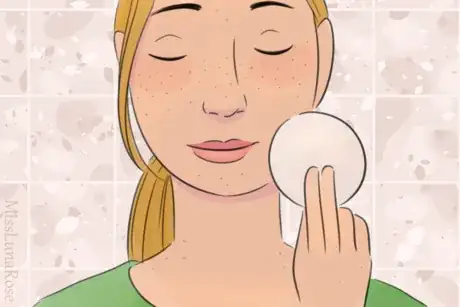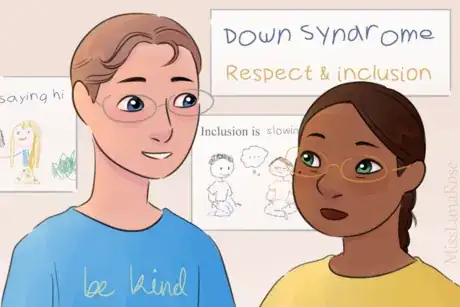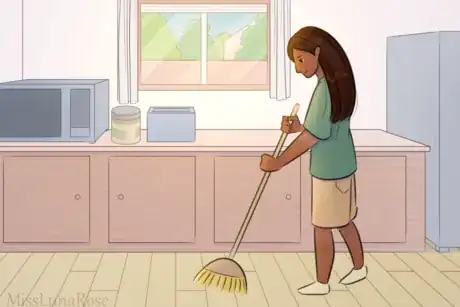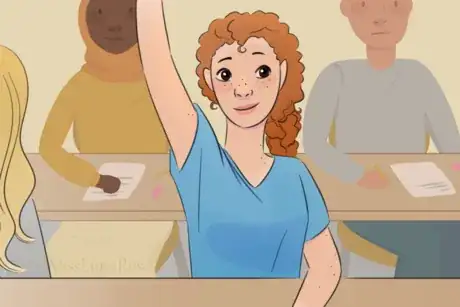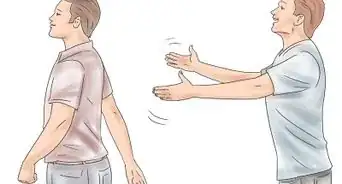wikiHow is a “wiki,” similar to Wikipedia, which means that many of our articles are co-written by multiple authors. To create this article, 112 people, some anonymous, worked to edit and improve it over time.
There are 9 references cited in this article, which can be found at the bottom of the page.
This article has been viewed 565,536 times.
Learn more...
Your teenage years may be the most challenging and formative times in your life. It’s important during this time that you develop good habits and a healthy mentality. By becoming a good girl, you can have an easier home and school life while bringing out your best self.
Steps
Starting with Yourself
-
1Become your own best friend. Don't treat yourself the way you wouldn't treat a friend. This means no more insulting yourself when you look in the mirror, setting harsh dieting rules, or beating yourself up when you make a mistake. If it would be mean to treat a friend that way, then stop treating yourself that way.
-
2Wear what makes you comfortable. Don't worry about trends or fashion "rules"—choose clothes that make you look good and feel confident and comfortable. It's usually good to wear something you can move around in.
- You don't need to wear makeup. If you decide to try it, start small and work your way up as desired.
- Wear clothes that make you feel happy. Whether you love lace, rainbows, overalls, or poofy skirts, you should choose clothes that work for you.
- Skimpy outfits can move around when you wear them, and it's no fun to be constantly monitoring your neckline or hem. Wear clothes that are comfortable to wear and carry so that you can have fun without worrying about whether your clothes are in place.
Advertisement -
3Take good care of your body. Treat it with respect, and look after your health. Work fruits, vegetables, whole grains, and fruits into your diet. Get plenty of sleep and relaxation. Find ways to make exercise fun, like dancing, swimming, walks with loved ones, and backyard sports.[1]
- Focus less on what your body looks like, and more on what it can do.
- Drinking, smoking, and drugs are very bad for you! Avoiding or quitting them will help you feel more energetic, positive, and alert.[2]
- Try to go to bed and wake up at around the same time each day. This will help your body get into a good rhythm. Ask your parents to remind you to go to bed if it helps.
-
4Make the most out of your free time. Your free time is precious, so use it for what matters most to you. Engage in your favorite hobbies, read good books, and hang out with people you love. To shake things up, make a list of all the things you'd like to try someday. Then start trying them.
- TV is great for relaxing, but too much TV can leave you drained and tired. Balance your free time to include hobbies, family, and friends.
-
5Celebrate your mind. Just as you're growing physically and emotionally, you're also growing intellectually. Try reading books from different genres, from classics to science fiction. Try hobbies from arts and sciences. What is fun to you?
- Look for articles online about topics that you enjoy.
- Don't be afraid to try new things, even if you're not good at them yet. Remember, an expert has failed more times than a beginner has even tried.
-
6Be mindful of your media exposure. The media can have discouraging messages, such as hypersexuality, mean behavior, and rude and incorrect stereotypes. This is not healthy. Surround yourself with media that celebrates your values, and the type of person you want to be.
- Look for media that supports your self-esteem, especially in fighting negative stereotypes. A girl who loves robots could watch TV with women in STEM, a girl who uses a wheelchair could read books about people with disabilities, and plus-size girls can look at pictures of stunning women of the same size. Remind yourself that people like you exist and have worth.
-
7Let yourself struggle sometimes. Even the kindest, most cheerful people have bad days sometimes. It's okay to feel sad, get a bad grade on a test, or lose your cool every once in a while. Being good does not mean you have to be perfect, and people will understand that.
- If you feel down, try talking to someone about how you feel. You'll feel better, and they'll be glad they could help.
- If you make a big mistake, talk about it. Apologize to anyone you hurt, and ask how you can make up for it. The mistake is less important than how you handle it.
-
8Find inspiration for being good. Maybe this means talking to a loved one who inspires you, going to a religious or volunteering group, reading a book that exemplifies your values, or even re-reading this article. When you feel lost or uncertain, it can remind you of your purpose and the way you want to live your life.
Being Good at Home
-
1Respect and listen to your parent(s) or caregiver(s). They have more life experience than you do, so they may be wiser than you realize. Ask them for advice, and value the things they tell you (even if you don't always agree). Think about how many good things they have done for you. Chances are, you'll never able to stop counting.[3]
- Parents aren't perfect, and sometimes they give bad advice and make bad decisions. Hear them out, and then explain your point of view as calmly as you can. Work together to figure out a good approach.
- Don't accept a bad situation. Most parents are good (or at least decent), but some are mean or abusive. If things are bad at home, talk to another adult you trust. Try a teacher, school counselor, parent of a friend, clergy member, relative, or other adult who is a good listener. Talk to them about what's going on, and ask for help handling the situation.
-
2Offer help at home. When you see your parents or siblings looking like they need help (struggling with packages, doing chores, etc.) say "Is there anything I can do to help you?" Open doors for them, help carry things... little things can make a big difference.[4]
-
3Learn helpful skills. The next time you see your parents or older siblings doing chores, try asking them to show you how. The two of you can do it together. You'll practice and help out at home, and then you'll be good at it when you're an independent adult. Learn how to cook, do laundry, do housework, and other basic tasks. Help out your parents and anyone you see who could use a hand.
- Offer to babysit for your neighbor's young children when they go out at night. Teens can traditionally make good money this way.
- Try yard work like mowing your lawn, taking care of the plants, and weeding.
- Try your hand at basic engineering tasks, such as auto repair, changing a flat tire, and fixing a leaky tap. Girls are better at engineering than most people realize!
- Some parents are willing to set up an allowance in exchange for chores, or pay you for doing chores (e.g. $10 for mowing the lawn).
-
4Keep your space clean. Clean your room and any messes that you make around the house. If you see messes that are not yours, you can still help clean them up. Sweep, vacuum, put away clutter and dirty clothes, and clean things like windows and mirrors.
- Cleaning up other people's messes is nice, and optional. Don't feel obligated if you don't have the energy.
- To keep your room clean, try to get rid of all the clutter first. Throw all of your dirty clothes and bedding into a hamper, toss all of your trash in the garbage, and walk around with a trash bag to get rid of any unnecessary and unwanted knick-knacks.
-
5Be kind to your sibling(s). Look for the things that you have in common, and have fun together. Speak politely to them (even when they annoy you!), and respect their boundaries—they'll probably do the same to you in return.
- Let them have space when they need it.
- If you can't handle your siblings right now, then don't. Say that you need some quiet time, and retreat to a quiet space. Your siblings should respect that, and if they don't, ask an adult for help.
Being Good at School
-
1Be nice to your classmates and to your teacher. Be respectful, kind, and helpful to everyone at school. This will make people like and respect you more.
-
2Do your best to get good grades. Study for all tests and quizzes, because they all count. Turn in your homework on time and pay attention in class. Participate in class for even more points towards your grade.[5]
- Teachers love it when you raise your hand in class, whether it's to give an answer or ask a question. If you give a wrong answer, it's okay.
- You don't need to get perfect grades, or to work so hard that you get really stressed. Instead of putting in 110% effort all the time, put in a very good effort most of the time. Stressing out too much about school is bad for your health, and you should talk with a doctor if it's becoming a problem.
-
3Do your homework every night. Do your homework promptly every night and do the best job that you can on it. This will give you better grades, and it will also help you become more disciplined and responsible. [6]
- You may feel a lot better with your homework already started, or already finished. It's easier to have fun when you know that you've gotten some good work done.
-
4Break up your studying time. Cramming for three hours straight isn't good for your health, and you won't learn as much. Start working early to make it easy on yourself. Then you can take lots of study breaks and feel less pressured.
- Don't stay up late studying before a test. You need your brain to be fresh and alert, so get plenty of sleep in order to prepare.
-
5Be respectful during class. Look at the teacher, face front, and focus on note-taking and listening.
- Don't chat, text, pass notes, or use your phone in class. These are disrespectful to your teacher and your peers who are trying to learn.
- If you have a disability that causes you to fidget or appear inattentive to non-disabled people, let your teacher know. Find ways to accommodate your needs so you can focus.
-
6Ask for help if you're overwhelmed. Learn to ask politely for help if you are struggling in your classes. Most people love to give advice and be helpful, and your teachers want to see you succeed. Explain that you're struggling and ask for help. Their advice can help you, and they'll respect you more for it. Here are examples of ways to ask for help:[7]
- "I'm really struggling with this one project. Could you help me?"
- "I did my best, but I didn't understand everything in class yesterday. Is there anything online that could help me learn the material a little better?"
- "I don't understand what this homework problem is asking. Could you explain it to me, please?"
- "I'm stressing out so much about school that it's hard to sleep, and I get bad headaches. I think I have a problem with anxiety, and I want to see a doctor. I need help."
Being Good with Other People
-
1Be kind to other people. Remember the platinum rule: treat others the way they would like to be treated. This means being respectful and considerate.
- As a general rule, don't say something behind someone's back that you wouldn't feel comfortable saying in their presence.
-
2Be clear when you want something. It's normal to have wants and needs, so be assertive and ask for things. Use "I" statements like "I would like...", "I think...", or "When you ____, I..." [8]
- Being passive might feel kinder, but it isn't. Hinting or beating around the bush will only confuse or frustrate people.
-
3Learn to be a great listener. Listening and validating people's feelings are tremendously useful skills. This means treating them like what they say and how they feel is important (even if you don't agree with them). People will feel much better and start opening up to you if you do this.
- Most people don't want you to swoop in with advice. Instead, they first need someone to listen and help them work through their feelings. Once they've processed their feelings, then they may be ready to address their problems.[9]
-
4Practice random acts of kindness. Whether it's small like holding a door for someone, or big like creating a picture book for your little brother, random acts of kindness are a great way to be and feel good. Look for opportunities to make people smile.
-
5Say your kind thoughts out loud. If you think your friend's shirt is awesome, let him know. If your sister made a really cool science project, tell her how much you like it. Even a random compliment from a stranger can brighten someone's day.
- Sometimes it's a bad time—for example, you wouldn't stand up in the middle of a concert and shout "I love your singing!" You can wait until a good moment (e.g. after the concert), or tell other people about your thought. People always feel happy when they learn you've been saying good things about them behind their back.
-
6Look for the best in everyone. Everybody has positive traits, so look for them in each new person you meet. Treat them with the assumption that they are well-meaning and intelligent in their own way. They may just rise to meet your expectations.
- Keep doing this, and you will be a ray of sunshine that inspires others to be their best.
- A few people are mean and rude no matter what you do. Keep a safe distance from these people, and continue being positive. It may rub off on them, or it may not.
-
7Treat everyone with respect, including those who are different from you. It can be tempting to write people off as "weird," "stupid," or "stuck up." Don't. Everyone has a story, and is struggling in a way that you might not notice. Treat everyone like they are good at heart.
- Be respectful to everyone, including the people you don't like. They may warm up to you.
-
8Be polite. Courtesy will show others that you are considerate and mature. Use the phrases "please", "thank you", and "may I". Let other people go first. Get a book on everyday etiquette, or ask someone who appears to be particularly knowledgeable on it.
-
9Practice patience when you don't understand. People may say things that don't make sense to you—but they probably have a good reason. Instead of giving up or getting mad at them, ask questions. This works in a variety of perplexing situations, from a person who is acting strange to someone who is being mean.
- "That's interesting. Why would you say/ask/do that?"
- "I don't understand. Could you explain it?"
- "I'm surprised that an educated and considerate person like you would stereotype transgender people like that." (Compliments can defuse rude behavior.)
-
10Leave or defuse the situation if there's an argument. Nobody can truly "win" an argument. Calm yourself down, or excuse yourself if you don't think you can handle it calmly. You can always continue the discussion later when you have a cooler head.
- "I need to take a break."
- "I don't know how to respond to that."
- "I'm so upset, I don't know how to handle this. I'm going to take some quiet time."
-
11Surround yourself with people who make you feel happy. You won't get along perfectly with everyone, and that's okay. Spend your time and energy on the people who build you up and make you feel good. They can help you feel happy and remind you of the person you want to be.
- You're allowed not to be best friends with everyone. If you feel upset when you're around someone, be polite to them, and focus your attention elsewhere.
-
12Be mindful about your romantic relationships. A good girl doesn't rush into romance, and makes sure that she is ready before trying something new. Communicate with your partner, and talk about kissing and intimate touching before you do them.
- Learn how to say no. An "I don't want to," "Not tonight," "I'm not ready for that," or just plain "no" makes it clear to your partner how you feel.
- Learn to recognize danger signals. Some people are disrespectful: they push your boundaries, laugh off your discomfort or worries, or trash-talk other people. Steer clear of them.
-
13Show people how much you appreciate them. When someone does something kind for you, let them know you're grateful with a simple smile or "Thanks!" Give them a hug or some kind words sometimes, so they know how much you care.
Community Q&A
Did you know you can get answers researched by wikiHow Staff?
Unlock staff-researched answers by supporting wikiHow
-
QuestionWhat happens if you don't know how to respect?
 wikiHow Staff EditorThis answer was written by one of our trained team of researchers who validated it for accuracy and comprehensiveness.
wikiHow Staff EditorThis answer was written by one of our trained team of researchers who validated it for accuracy and comprehensiveness.
Staff Answer wikiHow Staff EditorStaff AnswerIt is always possible to learn how to be respectful of other people's perspectives, time and space, and you can do so by checking out the wikiHow: How to Be Respectful.
wikiHow Staff EditorStaff AnswerIt is always possible to learn how to be respectful of other people's perspectives, time and space, and you can do so by checking out the wikiHow: How to Be Respectful. -
QuestionHow do you spend more time with family?
 wikiHow Staff EditorThis answer was written by one of our trained team of researchers who validated it for accuracy and comprehensiveness.
wikiHow Staff EditorThis answer was written by one of our trained team of researchers who validated it for accuracy and comprehensiveness.
Staff Answer wikiHow Staff EditorStaff AnswerYou can find ways to spend to time with your family by setting aside weekend times to go and do things together like taking a walk, visiting a cultural place or having a meal with each other outside of the home (like a picnic or a restaurant treat). Ask family members when they'll be free and mark that time on a shared calendar as "Family Time" so everyone knows to set aside the time to get together. Evenings are another good time too, for playing games, reading or conversing together.
wikiHow Staff EditorStaff AnswerYou can find ways to spend to time with your family by setting aside weekend times to go and do things together like taking a walk, visiting a cultural place or having a meal with each other outside of the home (like a picnic or a restaurant treat). Ask family members when they'll be free and mark that time on a shared calendar as "Family Time" so everyone knows to set aside the time to get together. Evenings are another good time too, for playing games, reading or conversing together. -
QuestionCan I clean my room even it's night?
 Luna RoseTop AnswererAs long as no one else (like a sibling) is sleeping in your room, then sure! If other people are sleeping in nearby rooms, make sure that you clean quietly so you don't risk waking them up. If it's late but not your bedtime yet, or if you're unable to fall asleep, you can clean until you get tired or bored of it. As long as you aren't interfering with your own or someone else's sleep, it's okay to clean at any hour of the night.
Luna RoseTop AnswererAs long as no one else (like a sibling) is sleeping in your room, then sure! If other people are sleeping in nearby rooms, make sure that you clean quietly so you don't risk waking them up. If it's late but not your bedtime yet, or if you're unable to fall asleep, you can clean until you get tired or bored of it. As long as you aren't interfering with your own or someone else's sleep, it's okay to clean at any hour of the night.
Warnings
- Don't try to flatter people in school/workplace. Any compliments you give should be genuine, not tools for getting what you want.⧼thumbs_response⧽
References
- ↑ https://www.webmd.com/food-recipes/features/take-the-fruit-and-vegetable-challenge
- ↑ https://pubs.niaaa.nih.gov/publications/aa71/aa71.htm
- ↑ https://teen.allwomenstalk.com/reasons-to-listen-to-your-parents/
- ↑ https://www.ahaparenting.com/blog/5_Ways_to_Get_Kids_to_Help_Around_the_House
- ↑ http://mystudyfocus.com/articles/how-to-be-a-diligent-student/
- ↑ https://kidshealth.org/en/parents/homework.html
- ↑ https://www.quickanddirtytips.com/health-fitness/mental-health/how-to-ask-for-help
- ↑ https://www.positivityblog.com/better-listener/
- ↑ https://misslunarose.home.blog/2020/08/10/emotional-sand-castles/
About This Article
Growing up can be challenging, but being your best self will help you meet those challenges. To be a good girl, start by taking good care of yourself. Eat a healthy diet, try to get plenty of sleep every night, and get at least a little bit of physical activity every day. Spend time doing creative things, working on hobbies you enjoy, and hanging out with supportive people. Being good is also about how you treat others. Be kind and respectful to the people around you and look for ways to be helpful. Work on developing useful skills, like cooking, fixing things around the house, or doing yard work. Create good habits for yourself, such as doing your homework at the same time every night. Forming good habits early will make it easier for you to succeed later in life. To learn more about how to be good around the house and in school, continue reading for more helpful tips.


